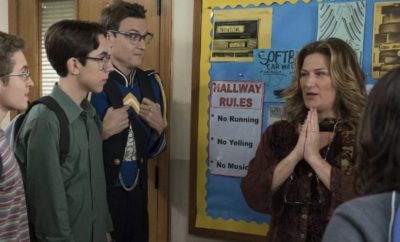
Interviews
Alexandra Silber – Camelot
By: Paige Zinaman
Q) What are some of the recent projects you have coming up?
A) I’ll be playing Guenevere in Camelot at Shakespeare Theatre Company in Washington, D.C. Shortly thereafter, I’ll be singing Dina in Trouble in Tahiti opposite Nathan Gunn at Tanglewood July 12. Then, my memoir White Hot Grief Parade will be dropping July 3 from Pegasus Books.
Q) You’ll be doing Camelot (which is very exciting), can you tell us about the story and who your character is?
A) Based on T.H. White’s classic novel The Once and Future King, Camelot first premiered on Broadway in 1960 and remains one of Alan Jay Lerner and Frederick Loewe’s most popular musicals. The show brings the world of King Arthur to life. The musical centers on the tragic, passionate love affair between Arthur’s wife Queen Guenevere and his favorite knight Lancelot—an affair that threatens to unravel the titular kingdom that the mythic king has so lovingly built.
I think that Guenevere’s crisis is exemplified in her opening song [“The Simple Joys of Maidenhood”], which is also the first moment that we meet her. When she makes this plea – “where are the simple joys of maidenhood?” – I think what she’s really saying is, “I am a woman who is really a girl that has never had any experiences of my own. I’ve never made any choices for myself.”
Q) What was it about Guenevere that drew you to this role? How do you get into the mind frame to play a character such as Guenevere?
A) What’s so exciting about this, as a feminist, is being able to say, “She’s crying out to have that choice!” Even though the song and the lyrics are childish, they still come from a place of yearning, of wanting independence and autonomy from the men that have controlled her life. While, absolutely, she is disloyal to her husband, it could also be seen that she’s ultimately loyal to her own needs and her own sexual awakening and that she simply chooses to self-actualize those dreams that she never got to have.
I think that there’s something really powerful about the aspect of her awakening as a woman that Lancelot represents. What I really love about her is that she’s nuanced. One of the things that T.H. White says about her is that Guenevere was simply herself; she was neither loyal nor disloyal. She was all of these things; she was a real person. What I love about that is that she has this incredible loyalty to Arthur. She respects him; she admires him. And he is the father of her mind and her intellectual awakening as a woman, queen and leader. But they lack this very important part of being a human being and being a woman, which has to do with the physical experience and the fullness—and almost the spirituality—of sex that she experiences with the incredibly God-oriented Lancelot. Their relationship is not just based in the carnal, but in God. So, I think that’s why she is a person to be admired: that, though the conventions of morality judge her, actually what she’s done is chosen to have a full life. While it’s still morally dubious, she didn’t have much of a choice. So, I really am looking forward to digging into those nuances and not necessarily presenting a person as morally righteous or morally bad, but as morally and spiritually and sexually conflicted, as so many of us are, moment to moment. T.H. White describes Guenevere as a real person—she was neither good nor bad; neither loyal nor disloyal—she was all of these things. As are we all.
Her strength as a character comes from the fact that she is someone who is deeply flawed and, as you say, deeply conflicted. She truly does get fulfillment from two men that are each serving different parts of her life.
Q) Do you find it challenging to tell a story such as Camelot knowing there are fans of the original story?
A) Not at all— if I’ve learned anything from and in the theatre over the years it is that we human beings are creatures of both wanting and needing to hear our stories told and retold. Why else would we reimagine Shakespeare, the Greeks, world mythology, not to mention returning to sacred allegories again and again?
Q) How and when can audiences come see Camelot?
A) Opening night is May 29, 2018 at the Shakespeare Theater in Washington, DC.
Q) This Spring you’ll also be starring in Leonard Bernstein’s Trouble in Tahiti. Tell us about your character Dinah and a little bit about the story.
A) Trouble in Tahiti is about an almost overtly conventional upper middle-class couple at the dawn of the 1960s suburban America. It examines internal dreams and the concept of the “pursuit of happiness” promised to Americans, just as America was about to change forever.
Dinah is a dreamer, a deep feeler and an empath with a well of sorrow as well as a wild sense of humor. If she were alive today she’d likely be a feminist because so much of her arc is about reclaiming her sense of self inside her rigid gender role as a wife and mother.
The score is achingly beautiful, poignant, hilarious, and tragically human.
Q) You’ve just released a new novel called After Anatevka, what brought about writing this novel and what it’s about?
A) I have been so fortunate to play Tevye’s two oldest daughters in the musical Fiddler on the Roof on both sides of the Atlantic— first as Hodel in the 2007 West End revival and most recently as Tzeitel in the 2016 Tony-nominated Broadway revival.
When I played Hodel in London, I had recently lost my own “Papa” to a long battle with cancer. Every day for two years I spoke Hodel’s final words “Papa, God alone knows when we shall see each other again…” Each time as Hodel said goodbye, so did I.
I was deeply haunted by Hodel’s courage, faith and fierce intellect that was ignited by her true love for the Socialist university student: Perchik. In the second act, Hodel boards a train to join Perchik in a Siberian prison…and we never hear from her again…But I needed to know what happened to her.
Thus, I began writing After Anatevka, an original piece of historical fiction to chart Hodel’s journey. It truly was a journey from stage to page.
Q) What do you hope readers take away from reading your book?
A) After Anatevka really offers some chilling contemporary parallels, with a central message of faith and hope. It is “Shalom Aleichem meets Dr. Zhivago” — oral tradition meets sweeping love story, with a brilliant and strong female protagonist.
Q) The arts in schools are often so low on the chain of importance that it’s mostly overlooked, how can students, teachers even parents shine more light on the importance of the arts?
A) The first and most important aspect of arts education is that is must begin at home. If parents and families value the arts, they will pass that import on to their children. But the arts belong in schools, for a myriad of reasons.
Music, visual art, creative writing and dance all belong in schools, but because my background is predominantly in theatre I will use a theatrical example: theater’s earliest origins extend back to Ancient Greece, where participation in the Festival of Dionysus, a multi-day cultural event, was a requirement of citizenship! Theater was not about celebrities or spectacle; it was about telling stories for the purpose of the public having a cathartic experience together. Aristotle defined it as “the purification of the spirit…by witnessing the playing out of such emotions or ideas on stage.” The result is positive change. Especially in fractious times like ours, when there is great fear and even greater uncertainty, theater can be a place of emotional and societal healing.
Further, not every human being possesses numeric or linguistic intelligence (the two “kinds of smart” that are predominantly measured in conventional schooling) and the arts offer students an additional way to excel, process and experience the world and to deeply contribute to society.
Q) You’re an avid blogger, what do you blog about and how might fans reading this go about finding your posts?
A) My blog turned ten last year! Over seven hundred posts are available at alexandrasilber.blogspot.com.
Q) Is there any advice you would like to give to aspiring singers, writers, actors, etc.?
A) Success is not what you do, it is how you feel about what you do.
Q) What would you like to say to everyone who is a fan and supporter of you and the work you do?
A) Infinite gratitude.



You must be logged in to post a comment Login